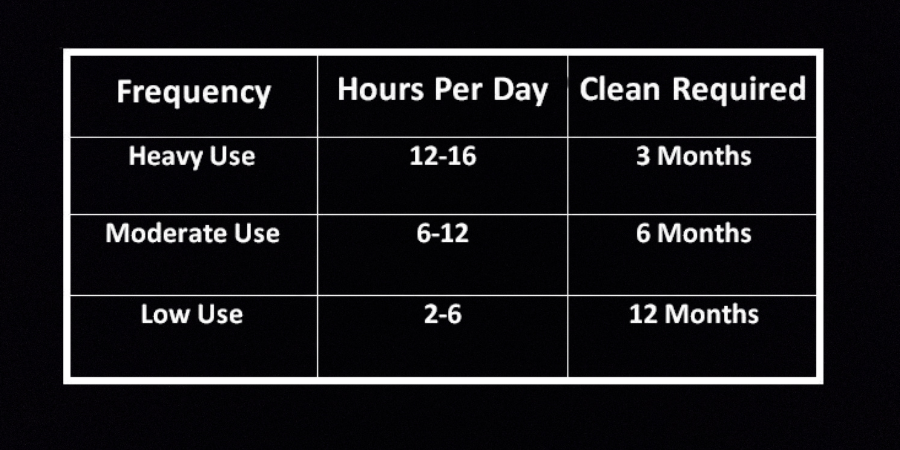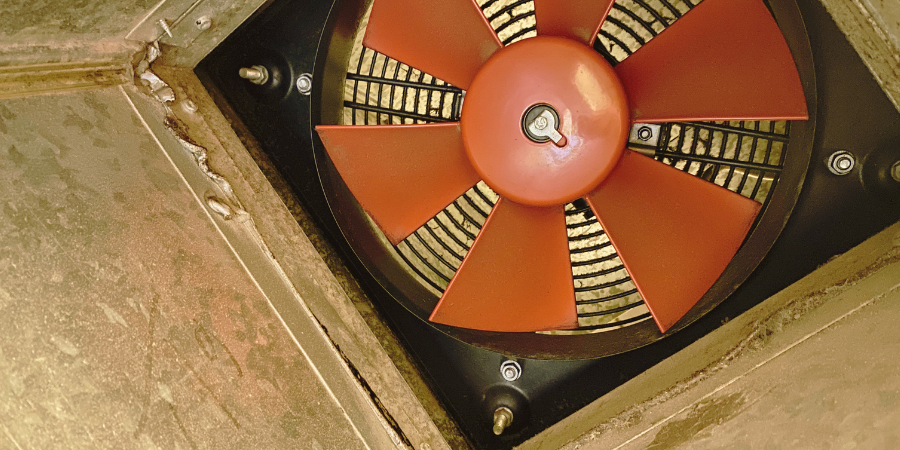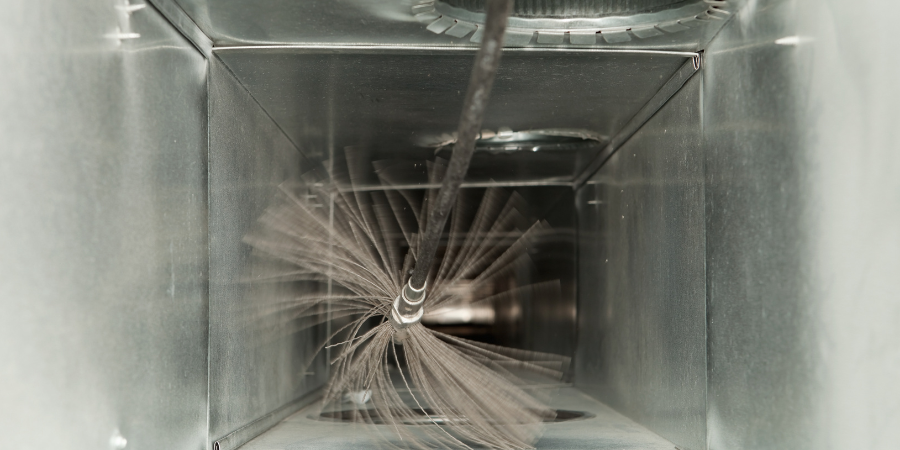
You Don't Care What Oil They Use!
Getting your kitchen extraction system cleaned in Bristol is like having your car serviced, you don't care what oil they use, what filters they change, or what brand of bulbs they install. You don't even care how the service will improve your cars performance. But you do care how disappointed your kids will feel if you miss their school play, because you're stranded on the hard shoulder waiting for recovery.
Yes, you will get a certificate for the Kitchen ventilation clean.
Yes, the Extraction system will run smoother and safer.
And yes, the canopy and filters will look all shiny and new.
But more importantly, you won't have to make that gut-wrenching call to loyal customers, cancelling their Christmas dinner because you forgot to get the extract system cleaned.

At Clean Grewp, we've got you covered, we'll tackle everything from internal and external canopy hood cleaning to grease filters, ducts and extractor fans. Using heavy duty de-greasing chemicals that zap away fat, grease and dirt, with a long reach duct cleaning machine that reaches all the hard to access areas.
Don't underestimate the significance of a clean kitchen ventilation system in Bristol - ensure the safety, efficiency, and compliance of your commercial kitchen with regular professional maintenance.
Now, how often should you schedule a kitchen extrator clean in Bristol? Well, it depends on how much you use your extraction system. The Industry regulator 'BESA' sets out guidlines known as TR19, as these guidelines are recognised by the Confederation of British Insurers - your insurance company will expect you to comply with the guidelines. Below is a handy table with recommendations on how often the kitchen ventilation system is cleaned. Stick to those guidelines, and you'll keep your extraction systems in tip-top condition and your business compliant.

We get it, your business can't afford any downtime. That's why our cleaning services in Bristol are available 24/7, 365 days a year.
No disruptions to your usual trading hours - promise.
Extractor Fan Cleaning Bristol
If you skip the regular clean of your kitchen extractor fan, it's not just about grease buildup - it could actually harm your system. Accumulated grease and other gunk can mess with airflow, making your system less efficient and using up more energy. Plus, neglecting cleaning can affect your insurance coverage, especially since dirty areas are more prone to fire risks. Getting your kitchen extractor fans professionally cleaned in Bristol on a regular basis is a smart move. We always provide before and after photos and the hygiene certificate to show you're up to date with health and safety regs. Don't forget, bacteria love to hang out in neglected extractor fans, posing a serious health hazard to your staff and customers.

Grease Duct Cleaning Bristol
The filters in your kitchen canopy work hard to catch the grease, but they're not foolproof. Some grease still manages to sneak into the ducts, coating everything from the extractor fan to the duct walls. This build up doesn't just make your kitchen less efficient; it also increases the risk of a fire.
If that grease starts leaking out, your neighbours may start complaining about funky smells and the slippery surfaces it creates. To avoid all that hassle and stress, regular cleaning by the professionals is a must.
And here's something else to keep in mind, many modern kitchens have gas interlock systems. These systems keep an eye on airflow in the ducts and canopy. But when grease messes with that airflow, it can lead to problems with the gas interlock system. If things get too clogged up, your gas supply will get isolated until the grease ventilation system is deep cleaned in Bristol.

Canopy Cleaning Bristol
In the busy world of commercial kitchens in Bristol, the importance of maintaining a clean canopy cannot be overstated. Beyond ensuring a tidy and hygienic workspace, regular cleaning of your kitchen canopy is vital for several reasons. First and foremost, it's a matter of safety. The accumulation of grease and residue within the canopy poses a significant fire risk. Grease deposits can easily ignite, leading to potentially devastating consequences for your kitchen and its occupants. Moreover, a dirty canopy can impair the proper function of your ventilation system.
As grease builds up, airflow becomes restricted, diminishing the extract system's efficiency and potentially causing overheating or malfunctions. This not only compromises the comfort of your kitchen environment but also increases energy consumption and operational costs. Additionally, neglecting canopy cleaning can result in breaches of health and safety regulations, potentially damaging your business's reputation and legal compliance. By investing in professional canopy cleaning services in Bristol, you not only mitigate these risks but also extend the lifespan of your equipment and maintain optimal kitchen performance.

Our Thoughts On Kitchen Ventilation Cleaning In Bristol
The Kitchen is the heart of your restaurant, Cafe or Takeaway. It's where the magic happens, where culinary delights are born, and where the hustle and bustle never ends. But amidst the clanging pots and sizzling pans lies a silent hero, the kitchen grease extraction system. The canopy, ducts, vents, hood, and extractor fan works tirelessly to whisk away smoke, fumes, and airborne grease. Yet, it's often overlooked until it's too late.
The Perils of Neglect
Imagine this, a bustling Commercial kitchen in the heart of Bristol, orders flying in, and chefs cooking up a storm. But there's a hidden danger lurking above, a grease-laden ventilation system. It's not just an unsightly mess; it's a tinderbox waiting for a spark.
Health and safety aren't just buzzwords, or a tickbox exercise - they're paramount in any commercial kitchen. A clogged kitchen extract system can lead to poor air quality, affecting the wellbeing of staff and customers. And let's not forget the fire risk – greasy ducts are a real fire risk and it only takes a small flame to cause a disaster.
TR19 - Your Blueprint for Safety
In the UK, we should never overlook kitchen safety, especially concerning cleaning kitchen ventilation systems. That's where BESA TR19 regulations come into play. These guidelines are the gold standard for cleanliness and fire safety in commercial kitchens. They outline how often your extraction system should be cleaned, based on usage:
- Light use (2-6 hours per day): Clean every 12 months
- Moderate use (6-12 hours per day): Clean every 6 months
- Heavy use (12-16 hours per day): Clean every 3 months
Adhering to these regulations isn't just about ticking boxes; it's about protecting your business, your people, and your customers.
A Well-Oiled Machine
Regular cleaning of your kitchen's grease extraction system isn't just a regulatory hoop to jump through. It's a commitment to kitchen cleanliness and efficiency. A clean system means better airflow, reduced odours, and a cooler working environment. It's about creating a space where chefs can do their best work, and customers can dine without the faintest whiff of last night's fry-up.
Caring for Your Crew and Customers
At the end of the day, it's not just about the nuts and bolts, it's about the people. A clean kitchen is a happy kitchen. It's a place where chefs aren't battling smoke and staff aren't coughing through their shifts. It's where customers come for the experience, not just the food. And that experience starts with the air they breathe the moment they walk through your door.
Case Study of a Kitchen Ventilation Clean In Bristol
So, this kitchen extraction system clean was actually undertaken in a town about an hour away from Bristol. But it's a great example of the type of extract clean we see in Bristol on a daily basis.
The Business in need of the deep clean was a pub, located in a rural location with not a great deal of passing trade. However they had a loyal base of local customers and the pub opened its commercial kitchen 3-4 days a week.
The Business had recently sold and the new owners had no idea of the grease vents needing any form of ongoing cleaning by a specialised cleaning company.
This is actually a common occurrence, there will be hundreds of restaurants, hotels, bars all over Bristol, that never have their ducting cleaned until either their insurance company asks them for proof of a clean or the extractor fan stops working.
The new owners sent us over some images of the canopy, fan and duct. Within half an hour we got a quotation and availability back over to them, shortly after they emailed back to confirm.
Within 10 days we got the clean completed and certified. The client will get a call from us in twelve months to schedule another clean, a happy client that left us some great feedback.
Total cost: £450 (prices as of October 2023)
TR19 Explained
If your business has ductwork within its premises, you’ve likely heard about TR19 regulations. But what exactly are they, and why should you care? In this section, we’ll break down the essentials of TR19, ensuring you’re well-informed without the jargon.
What Are TR19 Regulations?
TR19 regulations serve as best practice guidelines issued by the Building Engineering Services Association (BESA). These guidelines outline how you should maintain your building’s ductwork to ensure a safe and healthy workplace for your employees.
Why Should You Pay Attention?
For over two decades, TR19 has been the gold standard for ductwork cleaning. Insurance companies often require a certificate proving that your ductwork meets TR19 standards before issuing coverage. So, whether you’re a commercial or industrial building owner, compliance matters.
You may wonder what does TR19 entail? - Let’s dive into the key aspects:
Health and Safety: TR19 ensures your ductwork aligns with health and safety regulations, clean ducts contribute to a healthier indoor environment.
Fire Safety: Properly maintained ducts reduce fire risks. TR19 guidelines help you stay compliant in this critical area.
Remember, keeping your ductwork TR19-compliant isn’t just about ticking boxes—it’s about safeguarding your property and everyone within it. So, next time you think about ductwork, think TR19!
Access:
When it comes to TR19 regulations, ensuring proper access to your ductwork is essential. Your ductwork must be free from irregularities and obstacles.
Accumulation of grease, dust, and pollutants can degrade air quality, so maintaining clear access is crucial. Install enough access points in your duct system, these access points allow regular inspection and cleaning.
Access panels for inspection should match the duct material. Include features like seals and quick-release catches for safety and maintenance. Install access panels in accessible positions (typically on top or the side of the ductwork).
Inspection
Regular inspection is vital to prevent grease and dirt buildup. The following post clean tests are generally used by most specialised cleaning contractors.
Wet Film Thickness Test (WFTT): Measures the thickness of deposits on duct surfaces.
Deposit Thickness Test (DTT): Detects harder, carbonized deposits.
Perform these tests at least once every twelve months, or more frequently if your ducts are in constant use.
Remember, maintaining TR19 compliance ensures not only safety but also better indoor air quality. Keep those ducts clean!
TR19 emphasises inspections at specific locations within your duct system:
Canopy/Extract Plenum Behind Filters: Check this area for any buildup or irregularities.
Duct One Meter from the Canopy: Inspect for cleanliness and obstruction.
Duct Three Meters from the Canopy: Ensure proper airflow and cleanliness.
Duct Midway Between the Fan and Canopy: Critical point for assessment.
Duct Upstream of the Fan: Look for dirt, grease, or other contaminants.
Discharge Duct Downstream of the Fan: Verify cleanliness and efficient airflow.
Effective Cleaning Methods
TR19 provides clear guidelines for duct cleaning:
Hand Wiping: Manually clean surfaces within the system.
Hand Scraping: Remove heavy deposits of dirt or grease.
Chemical Treatment: Use chemicals to soften or dissolve stubborn deposits.
High-Pressure Washer: Dislodge specific deposits effectively.
Blasting Contaminants: Keep ducts and components clean.
The frequency of cleaning depends on duct usage:
Heavy Use (12-16 hours per day): Clean every three months.
Moderate Use (6-12 hours per day): Clean every six months.
Light Use (2-6 hours per day): Clean every twelve months.
Keep your ductwork in top shape for better air quality!
Beyond cleaning and maintenance, proper documentation is crucial for assessing your ductwork. Here’s what you need to keep track of:
Systems and Surfaces Cleaned: Maintain records of which parts of your duct system have been cleaned.
Pre & Post-Clean Measurements: Document measurements before and after cleaning.
This helps evaluate the effectiveness of the cleaning process.
Photographic Records: Capture visual evidence of the cleaned areas.
Photos provide transparency and accountability.
Additional Work Details: Note any extra tasks related to ductwork maintenance.
Keep a record of repairs or modifications.
COSHH Data (Chemical Usage):
Record information about cleaning chemicals used.
Ensure safe handling and compliance.
Future Cleaning Recommendations:
Document suggestions for future ductwork cleaning.
Plan ahead to maintain cleanliness.
General Observations:
Assess overall cleanliness and system performance.
Note any issues or improvements.
Only after all of these points have been satisfied, can the specialised cleaning contractor supply certification for the clean.
Kitchen Ventilation Cleaning Bristol Q&A's
Q: Why is it essential to clean kitchen grease extraction systems regularly?
A: Regular cleaning of kitchen grease extraction systems is crucial for maintaining a safe and healthy kitchen environment. Grease build up not only poses a significant fire hazard but also compromises airflow efficiency, leading to increased energy consumption and potential equipment malfunctions.
Q: How often should a kitchen grease extraction system in Bristol be cleaned?
A: The frequency of cleaning depends on various factors, including the type of cooking done, the volume of cooking, and how many hours a day you run the extract system. Generally, systems should be cleaned annually at an absolute minimum, but high-volume kitchens may require more frequent cleaning to ensure optimal performance and safety.
Q: What are the consequences of neglecting to clean a grease extraction system?
A: Neglecting to clean a grease extraction system can lead to several consequences, including increased fire risk, decreased airflow efficiency, foul odours, hygiene and safety breaches and costly equipment repairs caused by grease buildup. Many restaurants and bars in Bristol have had fires within the kitchen ventilation system.
Q: How can regular cleaning of grease extraction systems ensure compliance with health and safety regulations?
A: Regular cleaning of grease extraction systems is essential for compliance with health and safety regulations, commercial kitchens in Bristol are obliged to maintain and clean functional ventilation systems to prevent fire hazards and ensure food safety standards are met.
Q: What are the benefits of hiring professional cleaning services in Bristol for kitchen grease extraction systems?
A: Professional cleaning services have the expertise, equipment, and techniques necessary to thoroughly clean and maintain kitchen grease extraction systems in Bristol. By outsourcing this task to professionals, businesses can ensure compliance with regulations, minimise fire risk, improve airflow efficiency, and prolong the lifespan of their equipment.
Q: Can dirty kitchen grease extraction systems affect the taste and quality of food?
A: Yes, dirty grease extraction systems can negatively impact the taste and quality of food. Grease buildup can lead to unpleasant odours and flavours being transferred to food items, compromising their quality and potentially harming the reputation of the establishment.
Q: How does cleaning the kitchen grease extraction systems contribute to energy efficiency?
A: Cleaning kitchen grease extraction systems in Bristol improves airflow efficiency, allowing ventilation systems to operate more effectively. This reduces the need for excess energy consumption to maintain proper airflow, resulting in lower utility bills and improved energy efficiency for the kitchen.
Q: What steps can businesses take to ensure their kitchen grease extraction systems are effectively maintained?
A: Businesses can take several steps to ensure their kitchen grease extraction systems are effectively maintained, including scheduling regular professional cleans, implementing proper cleaning procedures between professional visits, monitoring the ventilation system performance, and addressing any issues promptly.
Q: Are there any environmental benefits to cleaning grease extraction systems?
A: Yes, cleaning the kitchen grease extraction system can have environmental benefits. By reducing grease buildup and improving airflow efficiency, clean systems can lower energy consumption, resulting in reduced greenhouse gas emissions and environmental impact associated with energy production.
Q: How does cleaning grease vents contribute to a safer working environment for kitchen staff?
A: Cleaning grease vents removes fire hazards and reduces the risk of grease fires in the kitchen, creating a safer working environment for kitchen staff. Additionally, cleaner systems result in improved indoor air quality and reducing exposure to harmful airborne contaminants.
Q: What are some signs that a kitchen extraction system in Bristol needs cleaning?
A: Signs that a kitchen extraction system needs cleaning include visible grease buildup on surfaces, foul odours emanating from the system, decreased airflow, increased energy consumption, and frequent equipment malfunctions or breakdowns.
Q: Can regular cleaning of a grease extraction system help extend the lifespan of kitchen equipment?
A: Yes, regular cleaning of grease extraction system can help extend the lifespan of kitchen equipment by preventing damage caused by grease buildup and ensuring proper airflow to equipment such as range hoods, exhaust fans, and ductwork. We've cleaned kitchen extract systems in Bristol for loads of clients over many years. Well maintained ventilation systems definitely prolong the life of the equipment.
Q: How does cleaning the kitchen cooker hood contribute to maintaining a hygienic kitchen environment?
A: Cleaning the cooker hood removes grease, food particles, and other contaminants that can harbour bacteria and pathogens, helping to maintain a hygienic kitchen environment and reduce the risk of foodborne illnesses.
Q: Are there any special considerations for cleaning restaurants in Bristol that have a grease extraction system in a high-volume kitchen?
A: Yes, high-volume kitchens may require more frequent cleaning of grease extraction systems to keep up with the increased demand and grease production. Additionally, specialised cleaning techniques and equipment such as using long reach duct cleaning machines may be necessary to effectively clean larger systems.
Q: Can businesses save money in the long run by investing in regular cleaning of grease extraction systems?
A: Yes, businesses can save money in the long run by investing in regular cleaning of grease extraction systems. By preventing costly repairs, reducing energy consumption, and extending the lifespan of equipment, regular cleaning can result in significant cost savings over time.
Q: How does grease buildup in extraction systems contribute to foul odours in the kitchen?
A: Grease buildup in extraction systems can trap food particles and other organic matter, which can decompose over time and produce foul odours. These odours can be spread throughout the kitchen via the ventilation system, negatively impacting the working environment and customer experience.
Q: Can businesses in Bristol face legal consequences for failing to clean grease extraction systems?
A: Yes, businesses in Bristol can face legal consequences for failing to clean grease extraction systems. If a fire ignites within the kitchen extraction system - this could lead to injury or even death of a member of staff or customer.
Q: What role does grease extraction system cleaning play in preventing kitchen fires?
A: Grease extraction system cleaning in Bristol plays a crucial role in preventing kitchen fires by removing flammable grease build up that can ignite and spread fire rapidly. Regular cleaning reduces the risk of grease fires and ensures a safer working environment for kitchen staff.
Q: Are there any industry standards or guidelines for cleaning grease extraction systems?
A: Yes, there are industry standards and guidelines for cleaning grease extraction systems, including BESA TR19.
Q: How can businesses in Bristol ensure that their kitchen ventilation system is cleaned effectively?
A: Businesses can ensure that their kitchen ventilation system in Bristol is cleaned effectively by hiring reputable cleaning companies that employ trained technicians and use industry-approved cleaning methods and equipment.
Q: What factors should businesses consider when selecting a provider for grease extraction system cleaning services in Bristol?
A: When selecting a provider for grease extraction system cleaning services in Bristol, businesses should consider factors such as the company's experience and reputation, the thoroughness of their cleaning process, compliance with industry standards and regulations and the cost of services.
Q: How does cleaning the canopy contribute to maintaining a professional appearance for the kitchen?
A: Cleaning the canopy contributes to maintaining a professional appearance for the kitchen by keeping surfaces clean and free of grease buildup, which can detract from the overall cleanliness and appeal of the space. A clean and well-maintained kitchen instills confidence in customers and creates a positive impression of the establishment.
Q: Can businesses schedule grease extraction system cleaning services in Bristol outside of regular operating hours?
A: Yes, many cleaning companies offer flexible scheduling options, including cleaning services outside of regular operating hours, to minimize disruption to business operations. Businesses can coordinate with cleaning providers to find a convenient time for cleaning that works with their schedule.
Q: How does cleaning the extractor fan contribute to maintaining proper ventilation in the kitchen?
A: Cleaning the whole grease extraction system removes grease buildup that can obstruct airflow and impede proper ventilation in the kitchen. By ensuring clear pathways for air to flow through the system, cleaning helps maintain optimal ventilation levels and improves indoor air quality.
Q: Can businesses experience a decrease in customer complaints by regularly cleaning grease extraction systems?
A: Yes, businesses can experience a decrease in customer complaints by regularly cleaning grease extraction systems. Clean systems reduce the risk of foul odours, improve indoor air quality, and create a more comfortable and enjoyable dining experience for customers.
Q: How does cleaning grease extraction systems in Bristol contribute to reducing the risk of pest infestations in the kitchen?
A: Cleaning the kitchen grease extraction system removes food particles and grease buildup that can attract pests such as insects and rodents. By eliminating these attractants, cleaning helps reduce the risk of pest infestations and maintains a sanitary environment in the kitchen.
Q: Can businesses customise their duct cleaning schedule based on their specific needs?
A: Yes, businesses can customise their duct cleaning schedule based on their specific needs and preferences. Cleaning companies can work with businesses to develop a cleaning plan that takes into account factors such as cooking volume, type of cuisine, and regulatory requirements.
Q: How does cleaning the kitchen grease extraction system in Bristol contribute to the longevity of kitchen equipment?
A: Cleaning the kitchen grease extraction system removes grease buildup that can cause corrosion, damage, and premature wear and tear on kitchen equipment such as range hoods, exhaust fans, and ductwork. By keeping equipment clean and well-maintained, cleaning helps extend its lifespan and reduce the need for costly repairs or replacements.
Q: Are there any DIY methods for cleaning grease extraction systems, or is professional cleaning always necessary?
A: While there are some DIY methods for cleaning grease extraction systems, such as using degreasers and hot water, professional cleaning is typically recommended for thorough and effective results. Professional cleaners have the expertise, equipment, and techniques necessary to safely and efficiently clean the kitchen vent without causing damage or leaving behind residue.
Q: Can businesses in Bristol save money on insurance premiums by regularly cleaning grease extraction systems?
A: Yes, businesses in Bristol may be able to save money on insurance premiums by regularly cleaning grease extraction systems. Insurance providers often offer discounts or incentives for businesses that demonstrate proactive measures to reduce fire risk, such as regular cleaning and maintenance of kitchen ventilation systems.
Q: How does cleaning grease extract system contribute to maintaining a comfortable temperature in the kitchen?
A: Cleaning grease extract system improves airflow efficiency, allowing for better regulation of temperature and humidity levels in the kitchen. By preventing airflow obstructions and equipment malfunctions, cleaning helps maintain a comfortable working environment for kitchen staff and ensures consistent cooking conditions.
Q: Are there any specialised cleaning methods or equipment used for cleaning grease extraction systems?
A: Yes, there are specialised cleaning methods and equipment used for cleaning grease extraction systems, including steam cleaning, robotics, long reach tooling and specialised degreasers. These methods are designed to effectively remove grease buildup and ensure thorough cleaning of ventilation components such as range hoods, ductwork, and exhaust fans.
Q: Can businesses receive certification or documentation verifying the cleanliness of their grease extraction systems in Bristol after cleaning?
A: Yes, most cleaning companies provide certification or documentation verifying the cleanliness of a Bristol based grease extraction systems after cleaning. These documents can be valuable for demonstrating compliance with health and safety regulations, satisfying insurance requirements, and assuring customers of the cleanliness of the kitchen environment.
Q: Can businesses experience an increase in employee morale and productivity by regularly cleaning the kitchen ventilation system?
A: Yes, businesses can experience an increase in employee morale and productivity by regularly cleaning the kitchen ventilation system. A clean and safe working environment contributes to employee satisfaction and engagement, leading to improved morale and productivity among kitchen staff.
Q: How does cleaning the cooker hood contribute to maintaining a positive reputation for the business?
A: Cleaning the cooker hood contributes to maintaining a positive reputation for the business by demonstrating a commitment to cleanliness, safety, and professionalism. A clean and well-maintained kitchen environment instills confidence in customers and reflects positively on the overall quality of the establishment.
Q: Can businesses request a comprehensive inspection of their grease extraction systems before scheduling cleaning services?
A: Yes, businesses can request a comprehensive inspection of their grease extraction systems before scheduling cleaning services. An inspection allows cleaning technicians to assess the condition of the system, identify any areas of concern, and recommend appropriate cleaning solutions based on the specific needs of the business.
Q: How does cleaning grease extraction systems contribute to reducing the risk of grease-related accidents in the kitchen?
A: Cleaning grease extraction systems removes flammable grease buildup that can ignite and cause grease-related accidents such as fires and explosions in the kitchen. By reducing the risk of grease-related accidents, cleaning helps create a safer working environment for kitchen staff and minimises the potential for property damage and injuries.
Q: Can businesses receive ongoing support and assistance for maintaining their kitchen ventilation systems in Bristol after initial cleaning services?
A: Yes, many cleaning companies offer ongoing support and assistance for maintaining kitchen ventilation systems in Bristol after initial cleaning services. This may include scheduling regular cleans, providing maintenance recommendations, and addressing any concerns or issues that arise with the system over time.
Q: How does cleaning grease extraction systems contribute to reducing the risk of kitchen downtime due to equipment malfunctions?
A: Cleaning grease extraction systems removes grease buildup that can clog ventilation components and cause equipment malfunctions or failures. By ensuring proper airflow and ventilation, cleaning helps minimise the risk of kitchen downtime due to equipment issues, allowing for uninterrupted operations and business continuity.
Q: Can businesses customise the scope of cleaning services for their extraction system based on their budget and needs?
A: Yes, businesses can customise the scope of cleaning services for their extraction system based on their budget and needs. Cleaning companies offer a range of service options, from basic cleaning to comprehensive maintenance packages, allowing businesses to tailor services to fit their specific requirements and priorities.
Q: How does cleaning grease extraction systems contribute to maintaining compliance with health and safety regulations?
A: Cleaning grease extraction systems is essential for maintaining compliance with health and safety regulations, which often mandate the regular cleaning and maintenance of commercial kitchen ventilation systems in Bristol to prevent fire hazards and ensure food safety standards are met.
Q: Can businesses schedule emergency cleaning services in Bristol for their kitchen ventilation systems in the event of unexpected issues or emergencies?
A: Yes, many cleaning companies offer emergency cleaning services in Bristol for kitchen ventilation systems to address unexpected issues or emergencies, such as grease fires, equipment malfunctions, or regulatory breaches.
Q: How does cleaning the kitchen canopy contribute to creating a positive dining experience for customers in Bristol?
A: Cleaning the kitchen canopy contributes to creating a positive dining experience for customers by maintaining a clean, comfortable, and inviting atmosphere in the kitchen and dining areas. A clean and well-maintained kitchen environment reflects positively on the overall quality of the Bristol based establishment, enhancing customer satisfaction and loyalty.
